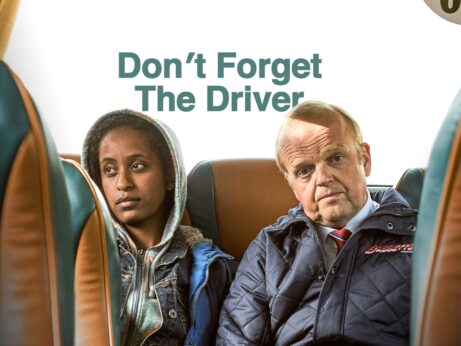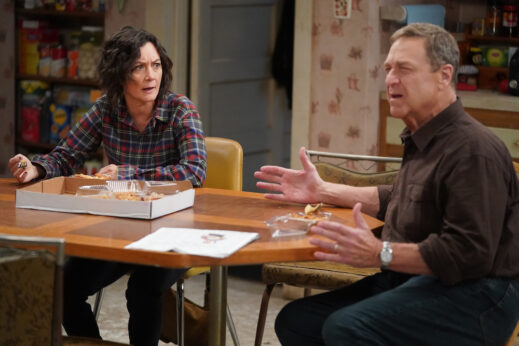
Few series on television focus either on the Earth’s first inhabitants, the Indigenous, now mostly quartered in slums across the world, or on workers, their lives, and daily concerns. We’ll be discussing the series Mystery Road, Don’t Forget the Driver, The Conners, and Superstore.
The Australian series Mystery Road, now back for its second season, bucks this trend in centering on the scattered remnants of the country’s Aborigines as they find themselves besieged in new ways by their Anglo colonizers. Likewise, the BBC’s Don’t Forget the Driver (available on Britbox in the U.S.) deals with a lonely and depleted working class playing out the string in a run-down shell of what was once a seaside resort, while The Conners and Superstore describe the effects of COVID. The Conners begins its new season with the extended family jobless and unable to pay the rent, and Superstore recounts the effects of the coronavirus on its essential workers caught between a company more concerned with profits than workers’ safety and customers hoarding supplies that are in too short supply.
This is the second season for Mystery Road (BBC in the UK and Acorn in the U.S.), a series based on an Aboriginal cop, Jay Swan (Aaron Pedersen), a character already established in two previous films. The mystery road that Jay travels is the wide-open country of Australia’s great and impoverished North, populated by its Indigenous and everywhere now the subject of a land grab by the Anglo tenants of its overcrowded cities looking for a property bargain. Season one centered around the death of a ranch hand in one of these towns and illustrated the monopoly on power a ranch owner exercised on the surrounding land and peoples.
Season two has Jay pursuing at its source a crystal meth drug ring that radiates out from the town he arrives in and showers death and destruction on the entire region. Jay quickly traces the potential source to a local trucking company in cahoots with another powerful ranch owner and suspects there is someone behind them. Part of season two is directed by Warwick Thornton, whose Sweet Country was an astute examination of how the Australian treatment of its Indigenous in 1929 was closer to 19th-century American slavery as an Aboriginal ranch hand who strikes a blow in self-defense against a cruel and tyrannical owner must flee into the bush country and eventually stand trial before a white jury for his crime.

Warwick brings that understanding of this perpetual oppression to the series, which also highlights, through several characters often revolving around the Indigenous female cop Fran who partners with Jay, the complexities of modern Aboriginal life and its encounter with colonial capitalism. A subplot involves a Swedish archeologist, Sandra, working on a dig in the town that she claims will illustrate the continuity of Indigenous life and thus serve as an answer to the claims that it is simply primitive. But, in much the way anthropology has been criticized as in its attempt to “understand” other ways of life it imposes Western concepts on these customs, the locals see her as intrusive. This distrust comes to a head when she conceals the traces of a crime she finds on the dig because it would imperil her work and when her offer to have the town keep her findings is refused by the university that stakes her claim. She is neither completely well-meaning nor innocent of the same exploitation that the Anglo crystal meth dealers are engaged in.
Of course, it is possible to argue that the national Australian Broadcasting Company is engaged in the same process in the symbolic realm in using the country’s Indigenous as a source of digital profit in creating a globally popular series. But something more is going on here. The series employs the iconography of the Western with Jay Swan as the prototypical silent Western hero, a kind of Aboriginal Shane. He is both stoic and blunt, but behind those qualities is the hardiness of a cop who is unwanted in Anglo law enforcement represented here by the local racist police chief who disparages him and may himself be imbricated in the drug running. He is resented also because he is an independent and powerful Aborigine and a stalwart defender of his people.
Season two illustrates these qualities in his steadfast and dogged pursuit of the Anglo dealers in the service of breaking their hold on the lives of those from whom they are growing rich. Late in the season, a secret pad of one of the dealers stresses the lavish lifestyle acquired by the profits of this purveyor of misery. Jay, as opposed to the Western sheriff, is not a defender of justice and the rule of law in the abstract, but rather a proponent of justice for his people, and they are the source of his strength and resoluteness.
Jay’s ex-wife Mary seems to follow him along the mystery road as she turns up here again, this time involved with an ex-cop who suspiciously offers Jay aid. Mary is a nurse and hospital orderly who cares deeply for her patients and over the course of the season also demonstrates a propensity for police work in aiding Jay. She seems headed in that direction in season three but the move from caregiver to cop is a questionable one. Jay’s daughter’s friend Shevorne, who functions as a surrogate daughter, also reappears, involved with a meth head boyfriend in a relationship that she must sort out.
The series does a remarkable job of embracing the complexity of a people attempting to cling to their own traditions and forced to transition to a world that is ever more not of their making.
Working-class TV: Few and far between
Network, national, and streaming TV is filled with characters living a lavish lifestyle or one relatively untouched by the problems that beset the majority of populations under Western capitalism. The richness of the interiors of most television series is designed to blend seamlessly either with the advertisements which surround them, where a problem is solved in one minute by an appropriate commodity, or by other streaming service fare which reinforces the idea that lavishness is omnipresent and to be aspired to. Can you say Emily in Paris?
A series which counters this characterization is Don’t Forget the Driver, a recounting of the put-upon life of an aging English seaside bus driver. Peter Green (Toby Jones in a series he also co-wrote) lives in the dying seaside resort of Bognor Regis, a smaller and more desperate Brixton—or in the U.S. a Coney Island or Asbury Park—past its day in the sun and haunted by its memories of former glory.
Peter is a single father whose daughter can’t wait to leave the town, takes care of a racist mother plagued by dementia, and ignores a would-be girlfriend. His plight is summed up each morning by his beat-up old car that only starts when he takes a hammer to it. Toby Jones is hilarious in the role, a British Bob Newhart, able to grind every laugh possible from the dry acceptance of his lot in life including putting up with a brother (also played by Jones), the apple of his mother’s eye who has cheated and swindled his way to his “promised land” of Australia where he affects an Aussie accent.
In each episode the beleaguered driver pilots another group of passengers to an obscure destination, none more hilarious than the group of septua- and octogenarians (the series is set in the 1980s) who barely survive the trip to Dunkirk in France to cheer on the British fallen at their gravesite. Unbeknownst to him, on the way back he is unwittingly part of a smuggling ring, bringing in a teenage African stowaway Kayla in search of her brother in London.

It’s Kayla’s presence that enlivens not only Peter’s life but also those around him, making his daughter more resolute about the path her life will take and prompting Peter to accept the relationship the resolute owner of a run-down sausage stand by the sea is offering him.
This crossing of an elderly European with an African refugee is becoming a staple of Euro representation. Its original and best rendering is Aki Karasmaki’s Le Havre, where a retired fisherman encounters and hides an African boy, assisting him on his journey. (A bleaker and dystopian version of this trope is the Dardennes’ La Promesse.) The current Netflix film The Life Ahead has Sophia Loren as an aged prostitute who takes an African boy under her wing in a relationship that seems arbitrary and never grounded in mutual acceptance.
The point of the encounter is that it is enlivening for the European, stuck in the deteriorating patterns of the Old Continent to encounter the youth and enthusiasm of the young African refugee. Don’t Forget the Driver doubles this pattern as Peter’s prejudiced mother also succumbs to the caring and fellow feeling of her Indian neighbor. Against the wave of anti-immigrant sentiment sweeping the continent, this trope offers the counter argument that the meeting of the two continents is a lifesaving breath of fresh air and necessary for the survival of an atrophied Europe.

The Conners is another series which deals with working-class life and which has in its current season taken as its point of departure the increased burden that COVID has brought to the working class in the U.S.—which is now almost synonymous with the working poor. The series was a hit in the 1990s for its co-creator Roseanne Barr, but after its successful revival, she was removed after a racist tweet. The fictional family is intact with Roseanne’s absence on the show being explained by her death from an opiate overdose, a sneaky way of describing her tweet as the product of a fevered drug-induced existence.
In the pilot of this new season, this extended family of Roseanne’s husband, two daughters, son, their children, and her sister each struggle due to the COVID shutdown to find work. The Conners’ plight acutely mirrors workers in the U.S., largely employed in the service industry, now finding those jobs have disappeared due to accelerated automation and online selling. These workers are encountering a difficult retraining process from semi-skilled to skilled laborer so that in one recounting a theme park stage manager must become an electrician, a taxi driver a plumber, and a cook must acquire the expertise of a software manager. Dan, Roseanne’s husband, meets a family friend who has found work as a process server announcing the eviction of working families from their homes. In the conclusion of the first episode, after fruitless attempts at finding work, the “family friend” appears at the Conner house to announce it is being repossessed. This is the presenting problem for a season in which the Conners’ plight increasingly will become the new normal for American workers, who must risk their lives now in search of dangerous work in the midst of a pandemic because of a government that refuses to expend money to take care of its most needy while its Congress schedules a special session to pass a bill appropriating more and more billions for war and armaments.
Finally, NBC’s Superstore, returning for its sixth and final season, began the season tracking the effects of COVID’s first wave, from March to July, on its diverse workforce in their attempts to both serve a public growing increasingly more hostile in its hoarding of diminishing supplies like toilet paper and a corporate hierarchy that salutes the workers as heroes for showing up for work but is unconcerned with supplying them with the masks that might keep them safe.
The pilot was supposed to be about America Ferrara’s leaving the show, having anchored it for five seasons and with the departure delayed because the final episode could not be shot with the show forced to shut production in the first wave. Instead, that storyline was delayed an episode so that the series could focus on how workers in the store coped with the pressures they were, and continue to be, under in the pandemic. It’s a remarkable instance of a series putting its social worth over more standard entertainment values as Amy’s departure and the resolution of the standard romance between her and her co-worker Jonah took a back seat to a pilot that stressed the overall impact of the crisis on a diverse workforce.
The success of these three instances, antidotes to Emily in Paris, proves not only that working-class television that deals with actual hardship and suffering is possible but that there is a thirst for it on the part of audiences.










